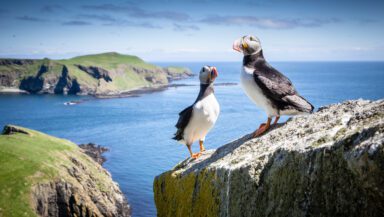New polling shows that almost two-thirds of Britons (63%) do not believe the UK government is doing enough to protect the oceans. It comes a year on from the historic agreement of a Global Ocean Treaty (4 March) which paves the way for the creation of sanctuaries at sea – the marine equivalent of National Parks.
Despite being one of the strongest backers of the Treaty over many years, the UK government has said it does not intend to sign it into UK law in the current Parliament. In a written statement to Parliament in October, Foreign Minister Andrew Mitchell said that legislation required to ratify the Treaty “is anticipated in the first session of a new parliament after a general election.”
The Global Ocean Treaty is the result of two decades of negotiations and was hailed as a triumph for nature and diplomacy when it was announced last year. It provides a powerful tool for creating Marine Protected Areas in the high seas where polluting and damaging activities such as industrial fishing would be limited.
The UK was among the first of 87 countries to sign the Treaty at the UN in New York last September, signifying its intention to ratify. In order to enter into force, the Treaty must be formally ratified by 60 countries but so far only two – Chile and Palau – have done so.
The YouGov survey, which was commissioned by Greenpeace, found that around two-thirds of respondents do not think the government is doing enough to protect the ocean (63%) or to achieve the global target of protecting 30% of the world’s oceans by 2030 (66%). More than half (53%) said the government should ‘urgently’ ratify the Global Ocean Treaty.
Elena Polisano, the head of Greenpeace UK’s oceans campaign, said: “Oceans are the world’s life support system so it’s no surprise that protecting them is such a popular cause. People know that a healthy ocean that is not polluted or overfished is better for everyone’s health and the environment. But it’s also clear that the British public believe government action is lagging behind. This is really disappointing because the UK led the way on getting the Global Ocean Treaty over the line – the government must now stop dragging its feet and help turn this agreement into real protection by signing it into law”
The poll found that the leading perceived threats to oceans are pollution (62%), climate change (35%), the decline of ecosystems and habitats (28%) and over-fishing (26%). Respondents were asked to pick two threats.
The high seas that make up two-thirds of the ocean that lie beyond national boundaries are home to millions of species and ecosystems, but less than 1% are fully protected. They are under increasing pressure from a range of threats, including industrial fishing, pollution and the emerging deep sea mining industry. To protect at least 30% of the oceans by 2030 – the internationally agreed 30×30 target – governments must protect more than 11 million km² of ocean every year.
In September 2023, Greenpeace International published a report setting out the political process to deliver this target. The report warns that cumulative pressures on the high seas are increasing, and quantifies for the first time the growing fishing activity in areas earmarked for protection, using data from Global Fishing Watch.
The UN Ocean Treaty is the most significant multilateral environmental deal since the 2015 Paris Climate Agreement. It has still only been ratified by Chile and Palau, underscoring an urgent need for more governments to write it into national legislation.
The Greenpeace ship Arctic Sunrise has started a six-week expedition to the Galapagos islands to document the positive effects of marine protection and to push states across the world to ratify the UN Ocean Treaty urgently.
ENDS
Contacts:
Kai Tabacek, media lead for oceans, Greenpeace UK: kai.tabacek@greenpeace.org / 07970 030019
Greenpeace UK press team (24/7): press.uk@greenpeace.org / 020 7865 8255
Interviews with Greenpeace spokespeople in the UK or onboard a ship in the Galápagos islands available on request.
Notes to editors
The full results of the poll are available here
New polling was commissioned by Greenpeace and carried out online between February 10th and 12th 2024. Total sample size was 2,090 adults. The figures have been weighted and are representative of all UK adults (aged 18+).
Pictures of sealife and previous Greenpeace actions in support of the Treaty are available here
Greenpeace UK has launched a petition calling on Prime Minister Rishi Sunak to implement the Treaty, which had gathered over 113,000 signatures at time of writing.
The historic Global Ocean Treaty was agreed on 4 March 2023, adopted in June 2023 and opened for signature at the UN in September 2023. The Global Ocean Treaty is a legally binding instrument under the United Nations Convention on the Law of the Sea (UNCLOS) on the conservation and sustainable use of marine biological diversity of areas beyond national jurisdiction (BBNJ).
The UK was one of the first countries to sign the BBNJ agreement at the UN on 20 September 2023. Lord Ahmad of Wimbledon, who signed for the UK, described it as “a major victory for ocean protection and multilateral diplomacy”.
Signing the Treaty shows an “intent to ratify”. Ratification requires domestic legislation, and would sign the Treaty into law. Greenpeace UK created an interactive map where ratification of the treaty can be monitored, along with threats on the oceans: https://maps.greenpeace.org/maps/gpuk/30×30/
All governments agreed to protect at least 30% of the world’s oceans by 2030 under the Convention on Biological Diversity in 2022.



